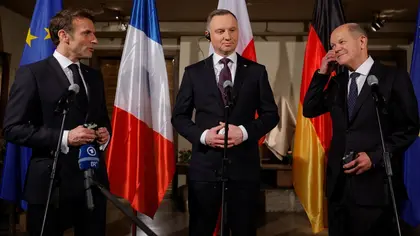The morning of the 59th Munich Security Conference started with rain and lots of commotion in the central part of the city. As every year, Munich was buzzing with numerous government officials, civil society and business representatives.
This year, however, the feeling was different. There was a sense of “Zeitenwende” or “the change of times,” a term most often used by various government officials. What began as a transatlantic conference almost 60 years ago with only 80 men discussing European security in smoke-filled rooms has turned into a global event that this year spotlights Ukraine, for obvious reasons.
JOIN US ON TELEGRAM
Follow our coverage of the war on the @Kyivpost_official.
The start of the conference on Feb. 17, marked the one year anniversary of the most important geopolitical events on the European soil since World War II. One year ago, the conference was held just before the brutal Russian invasion of Feb. 24. It was a time of great insecurity and anxiety, when President Volodymyr Zelensky called on the international community to be united against the growing Russian threat. “But, unfortunately, I only received [that unity] after the Russian bombs started to hit Ukraine,” Zelensky, said with a visible sense of frustration during the opening speech this year.
Zelensky’s appeal was very clear: There is no alternative to speed. Speed in the allies’ response to decision making and deliveries of arms to Ukraine, first and foremost. He also reiterated that there is no alternative to Ukraine’s victory in this war, nor to Ukraine’s membership in NATO and the EU.
While answering a question on Ukraine’s longstanding issues of corruption and government graft, Zelensky emphasized the Ukrainian public’s absolute aversion of the to any signs of corruption. He also expressed the conviction that post-war Ukraine will retain its clear course of anti-corruption reforms that are already unfolding.
The sense of urgency was very clear in his opening remarks as well as a degree of frustration with the most pressing decisions that affect Ukraine’s ability to defend itself.
The Europeans on board
The key European speakers who appeared on stage after president Zelensky’s remarks addressed the topic of Ukraine’s ongoing fight for freedom: namely, Germany’s Olaf Scholz and France’s Emmanuel Macron. Both leaders highlighted the importance of strengthening European security.
While Scholz’s remarks were very pragmatic in nature, highlighting Germany’s recent decision to increase its defense spending to 2% of its GDP on a permanent basis, Macron’s call to action was primarily focused on creating “global solidarity.” In practice, that means more European collaboration on security matters while also focusing on the players from the Global South in order to make the new global security architecture more inclusive and reflective of the current realities.
In that regard, the French president briefly mentioned the upcoming June conference in Paris aimed at bringing the representatives from Asia, Africa and South America in order to discuss the much-needed reforms of the international institutions such as the IMF, the World Bank and the UN system of governance, namely the Security Council, where Russia is a permanent member.
According to President Macron, there is no more room for double standards and we need to address the needs of the countries from the Global South in order to create a wider coalition of states interested in preserving an international order.
His remarks echoed the essence of this year’s report issued by the MSC titled “Re: vision.” This extensive piece of research examines the forces behind authoritarian revisionism in Russia and elsewhere, as well as the growing contest between different visions for the international order. It also promotes the debate on how the coalition defending the vision of a liberal, rules-based order can be widened and strengthened.
It is worthwhile noting that both the German and French leaders expressed their condemnation of Russia’s revisionism and their absolute readiness to assist Ukraine for as long as it is needed, but none of them clearly stated that Ukraine must win this fight. And this is very much consistent with their previous messaging: Russian must not and cannot win this war. But words do matter, as well as deeds that follow!
On the topic of urgency, when asked by the iconic CNN anchor Christiane Amanpour about the timing of the delivery of German tanks, Olaf Scholz responded with a comment that focused on the need to change the relationship between the Defense Ministry and German arms producers. In a nutshell, his comment implied that the processes that have been in place have to be revisited as there is a need for a continuous supply of defense materials not only for Ukraine’s needs, but also for a revised German approach to its own and wider European security.
The first day at MSC is far from over with numerous side events and public forums taking place. The topic of Ukraine’s war continues to penetrate every official discussion and side event, including those focused on the Global South. It is an omnipresent theme despite the visible resistance of the Global South representatives to address it.
Saturday’s sessions carry some promise to clarify the positions held by such countries as India and Brazil and to challenge their positions on Russia’s ongoing war of aggression.
Stay tuned…
You can also highlight the text and press Ctrl + Enter



